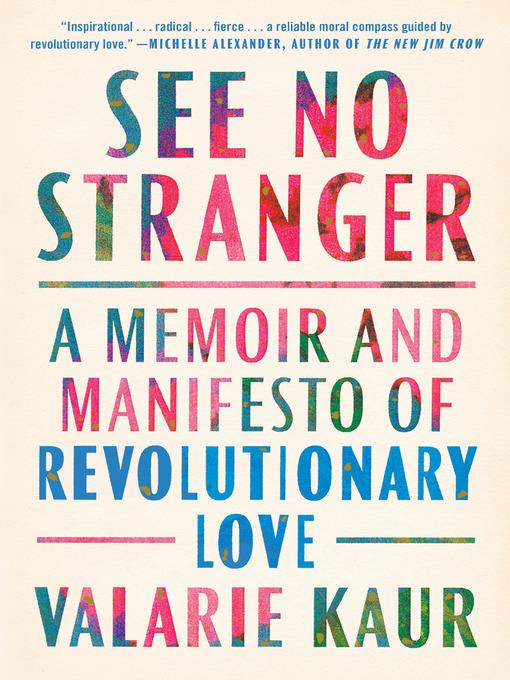
See No Stranger
A Memoir and Manifesto of Revolutionary Love
- اطلاعات
- نقد و بررسی
- دیدگاه کاربران
نقد و بررسی

May 1, 2020
A Los Angeles-based Sikh American activist, lawyer, and filmmaker tries to reinvent the wheel of love in her coming-of-age memoir. As the child of Sikh farmers in Clovis, California, Kaur grew up with the Punjabi phrase "chardi kala," often translated as "relentless optimism," a state prized by her faith. She has perhaps taken those words too much to heart in her first book, an overambitious blend of memoir, self-help, and left-leaning polemic. As a Stanford undergraduate, Kaur learned that a Sikh family friend had become "the first person killed in a hate crime after 9/11," and the tragedy led her to travel across the country to interview other victims, whose stories she told in the documentary Divided We Fall. At Yale Law School, Kaur served as a legal observer at a prisoner's hearing at Guant�namo, where the U.S. naval base just over the hill from the detention center was "a fantastical cross between small-town America and a Caribbean seaside resort," with fast food restaurants, tennis courts, and a bowling alley. Unwisely, the author folds vivid sections on those and other trips into a meandering, New Age-y brief on the "revolutionary" effort "to reclaim love as a force for justice in our time" and "to love even our opponents." Toward that end, Kaur suggests "meditating, expressing gratitude, retreating, bodywork, and being in nature" as well as other overfamiliar warhorses of the self-help genre. Throughout the book, her call for acts like "forgiveness" clashes with her view that rage is "a rightful response to the social traumas of patriarchy, white supremacy, misogyny, homophobia, transphobia, and poverty." Depending on the situation, that view is debatable, and while the author offers plenty of good material on the plight of Sikh Americans after 9/11, those elements account for less than half the book; the rest is the author's heavily ideological "manifesto." A unique portrait of post-9/11 Sikhs hampered by its rebranding of old ideas as "revolutionary."
COPYRIGHT(2020) Kirkus Reviews, ALL RIGHTS RESERVED.

Starred review from June 1, 2020
Kaur's debut is part memoir, part cultural commentary arguing that one way to combat hatred and ignorance is to take the Sikh approach of empathy and forgiveness toward those who harm or fear others. A Sikh activist, filmmaker, and political commentator, Kaur was born and raised in a large and loving Sikh family, one of few in an insulated California farming community. She became an activist partly because of her Sikh beliefs which involve equality, empathy, and love in response to escalating violence toward Sikhs in the United States following the September 11 attacks. The book is strongest when the author focuses on her personal experiences, her family life, and her activism during and after her time in law and divinity school. However, there are stretches where her rhetoric of "revolutionary love" slows down the narrative and becomes derivative. This flaw does not take away the central purpose of the book, which is the act of loving others--even ones that do grievous harm--is revolutionary in a time of confusion, heartache, and racial violence. VERDICT A beautifully written expos� of activism, rebirth and "revolutionary love" that is much needed for all readers in our current times.--Leah Huey, Dekalb P.L., IL
Copyright 2020 Library Journal, LLC Used with permission.

Starred review from June 1, 2020
This amalgam of activist handbook, self-help guide, memoir, and philosophical thesis is hard to define but unquestionably pertinent for tackling the pressing questions born of these times of deep political divide and global crises. Activist and civil-rights lawyer Kaur's straightforward writing style is the perfect match for her strikingly clear thinking, which together keep the reader focused on her call for revolutionary love. Kaur acknowledges that offering love and reconciliation as resolutions to social injustice can sound simplistic, then proves otherwise when she offers a nuanced approach to making them relevant in complicated contexts. Kaur's experiences growing up in a Sikh farming family in central California and her grounding in religious philosophy inform the way she defines her activism. Her efforts to give voice to the victims of post-9/11 hate crimes, pin down questions of identity in America, and illuminate the ways national policies can be defined by fear are all integrated into three sections about loving people you agree with, loving opponents, and loving ourselves. Kaur's expansive world view, unflinching approach to social justice, and abiding faith in wonder will make this a compelling read for all who perceive the inevitable intertwining of the personal and the political.(Reprinted with permission of Booklist, copyright 2020, American Library Association.)




دیدگاه کاربران